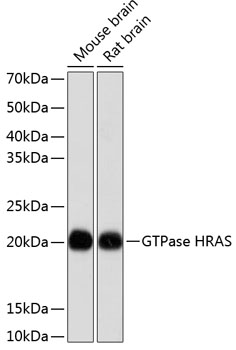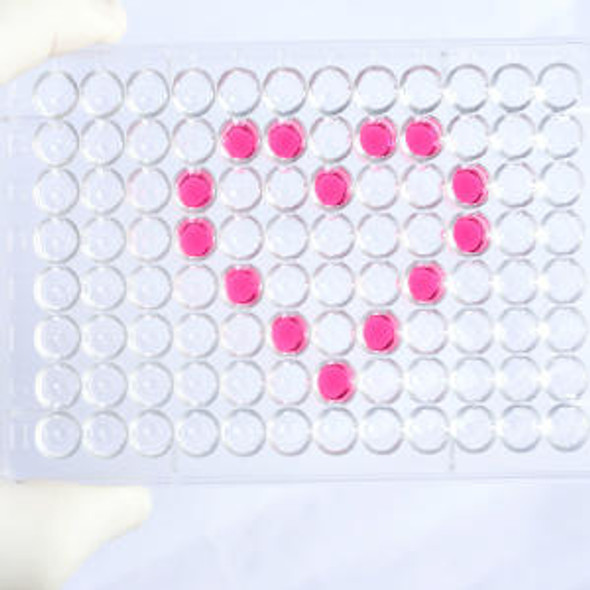| Synonyms: | C-BAS/HAS, C-H-RAS, C-HA-RAS1, CTLO, H-RASIDX, HAMSV, HRAS1, RASH1, p21ras, GTPase HRAS, HRAS |
| Background: | This gene belongs to the Ras oncogene family, whose members are related to the transforming genes of mammalian sarcoma retroviruses. The products encoded by these genes function in signal transduction pathways. These proteins can bind GTP and GDP, and they have intrinsic GTPase activity. This protein undergoes a continuous cycle of de- and re-palmitoylation, which regulates its rapid exchange between the plasma membrane and the Golgi apparatus. Mutations in this gene cause Costello syndrome, a disease characterized by increased growth at the prenatal stage, growth deficiency at the postnatal stage, predisposition to tumor formation, mental retardation, skin and musculoskeletal abnormalities, distinctive facial appearance and cardiovascular abnormalities. Defects in this gene are implicated in a variety of cancers, including bladder cancer, follicular thyroid cancer, and oral squamous cell carcinoma. Multiple transcript variants, which encode different isoforms, have been identified for this gene. [provided by RefSeq, Jul 2008] |
| UniProt Protein Function: | Involved in the activation of Ras protein signal transduction (PubMed:22821884). Ras proteins bind GDP/GTP and possess intrinsic GTPase activity (PubMed:12740440, PubMed:14500341, PubMed:9020151). |
| NCBI Summary: | This gene belongs to the Ras oncogene family, whose members are related to the transforming genes of mammalian sarcoma retroviruses. The products encoded by these genes function in signal transduction pathways. These proteins can bind GTP and GDP, and they have intrinsic GTPase activity. This protein undergoes a continuous cycle of de- and re-palmitoylation, which regulates its rapid exchange between the plasma membrane and the Golgi apparatus. Mutations in this gene cause Costello syndrome, a disease characterized by increased growth at the prenatal stage, growth deficiency at the postnatal stage, predisposition to tumor formation, mental retardation, skin and musculoskeletal abnormalities, distinctive facial appearance and cardiovascular abnormalities. Defects in this gene are implicated in a variety of cancers, including bladder cancer, follicular thyroid cancer, and oral squamous cell carcinoma. Multiple transcript variants, which encode different isoforms, have been identified for this gene. [provided by RefSeq, Jul 2008] |
| UniProt Code: | P01112 |
| NCBI GenInfo Identifier: | 131869 |
| NCBI Gene ID: | 3265 |
| NCBI Accession: | P01112.1 |
| UniProt Secondary Accession: | P01112,Q14080, Q6FHV9, Q9BR65, Q9UCE2, B5BUA0, |
| UniProt Related Accession: | P01112 |
| Molecular Weight: | 21kDa |
| NCBI Full Name: | GTPase HRas |
| NCBI Synonym Full Names: | HRas proto-oncogene, GTPase |
| NCBI Official Symbol: | HRAS |
| NCBI Official Synonym Symbols: | CTLO; HAMSV; HRAS1; RASH1; p21ras; C-H-RAS; H-RASIDX; C-BAS/HAS; C-HA-RAS1 |
| NCBI Protein Information: | GTPase HRas |
| UniProt Protein Name: | GTPase HRas |
| UniProt Synonym Protein Names: | H-Ras-1; Ha-Ras; Transforming protein p21; c-H-ras; p21ras |
| Protein Family: | HRAS-like suppressor |
| UniProt Gene Name: | HRAS |







